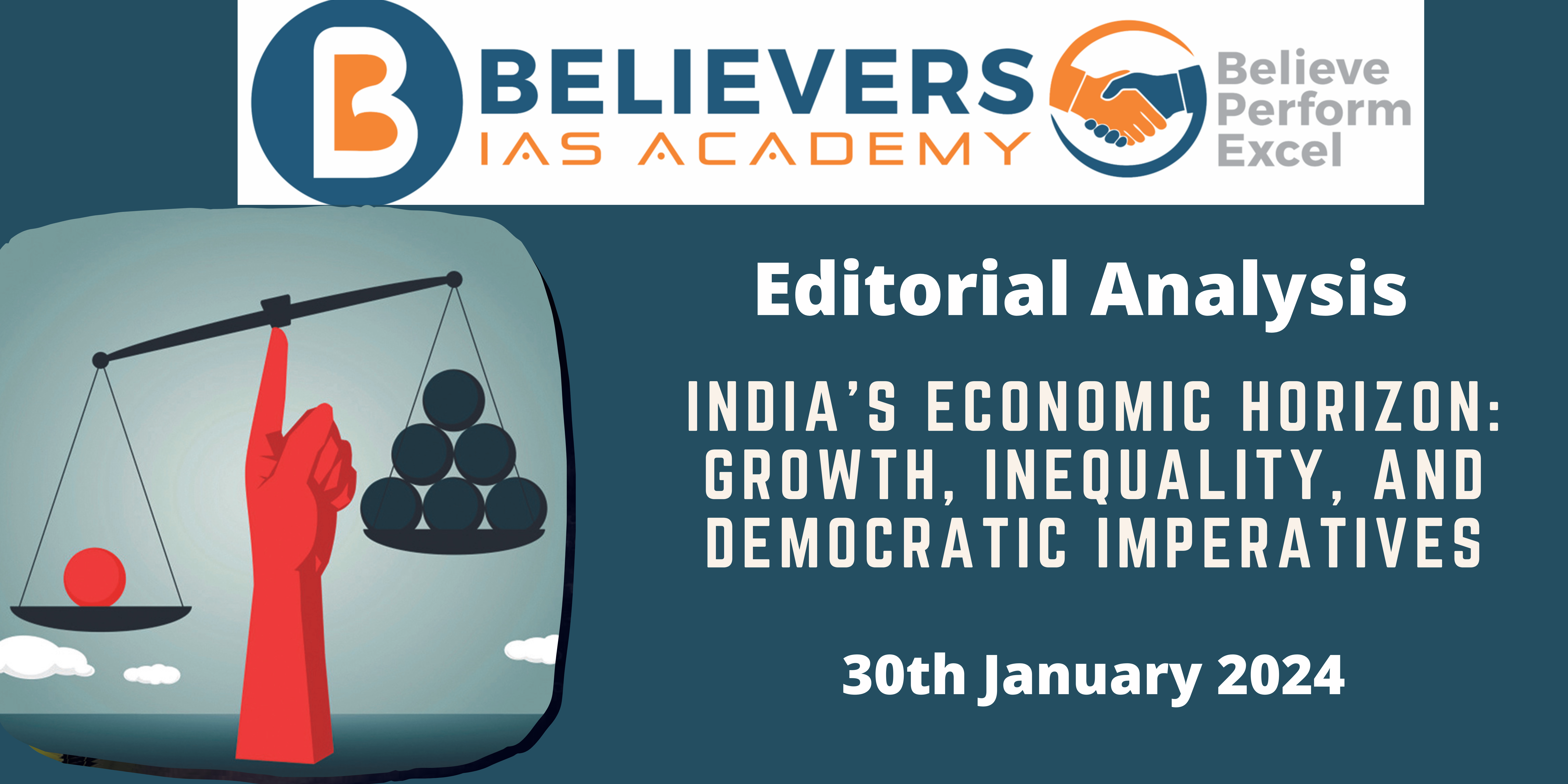India’s Economic Horizon: Growth, Inequality, and Democratic Imperatives
Context:
The media, attending the World Economic Forum, reported on optimistic statements regarding India’s economic future, echoing previous predictions about the nation’s economic growth. This includes the goal of a $5 trillion economy by 2024, as stated by Prime Minister Narendra Modi. Despite these ambitions, there’s a growing concern about the unequal nature of recent economic growth and its impact on various segments of the population.
Relevance:
GS-03 (Growth and Development)
Mains Question:
Evaluate the impact of India’s recent economic growth on income distribution and societal dynamics. How can policy frameworks be redesigned to ensure more inclusive and equitable growth, considering the democratic principles integral to the nation’s identity? (250 words)
World Economic Forum (WEF):
- Overview: The World Economic Forum (WEF) is a non-profit foundation established in 1971, headquartered in Geneva, Switzerland, and recognized by Swiss authorities as the premier international institution for public-private cooperation.
- Mission: Dedicated to enhancing the state of the world, the WEF engages leaders from business, politics, academia, and other sectors to influence global, regional, and industry agendas.
- Founder and Executive Chairman: Professor Klaus Schwab.
Key Reports Published by WEF:
- Energy Transition Index.
- Global Competitiveness Report.
- Global IT Report (Co-published with INSEAD and Cornell University).
- Global Gender Gap Report.
- Global Risk Report.
- Global Travel and Tourism Report.
Dimensions of the Article:
- Unequal Growth Trends
- Realities of Rural Wage Rates
- Income Disparities and Economic Growth
- Challenges of Inequality
- Democracy and Economic Outcomes
Unequal Growth Trends:
- Recent economic growth in India, while impressive, has been marred by a concerning rise in inequality.
- This is not a recent phenomenon; it gained momentum in the 1980s and has persisted since, making India one of the most unequal societies globally.
- Unfortunately, the present growth doesn’t seem to be reaching the poorest sections, contributing to a societal divide.
Realities of Rural Wage Rates:
- Examining rural wage rates provides a stark picture of this inequality.
- Rural wages, a critical indicator, show a modest 4.6% increase over the last nine years, indicating that the rising economic tide might not be lifting all boats.
- Moreover, the wage rate for non-agricultural and construction workers has, in fact, decreased, affecting a substantial portion of the workforce.
Income Disparities and Economic Growth:
- The implications are clear — despite overall economic growth, per capita income at the lower echelons remains stagnant or, in some cases, declines.
- Per capita income (PCI) is a measure of the average income earned by each person in a given area over a specified time period. It is calculated by dividing the total income by the total population.
- The economic trajectory seems to favor certain sections, widening the income gap and raising questions about the effectiveness of this growth in addressing the needs of the most marginalized.
Challenges of Inequality:
- Inequality is not merely an economic concern; it brings forth profound societal challenges.
- Unequal societies are susceptible to social pathologies, including violence, diseases, and mental health issues.
- This growing divide hampers collective action, hindering initiatives such as the Swachh Bharat Mission, where disparities in motivation for public contributions become evident.
Democracy and Economic Outcomes:
- The discussion extends beyond pragmatic challenges to the essence of democracy.
- India, with its democratic spirit, must grapple with the ethical dimensions of such economic disparities.
- Ignoring the gross inequality of opportunity, especially in a democratic setup, undermines the principles that form the foundation of the nation.
Way Forward:
- Rethinking Economic Priorities: It’s imperative to reconsider the predominant focus on maximizing economic size. While economic growth is a legitimate aspiration, a myopic pursuit of sheer economic magnitude may exacerbate existing disparities. A more inclusive and sustainable approach is needed to ensure that the benefits of growth are equitably distributed.
- Prioritizing Inclusive Policies: Policy frameworks must prioritize inclusivity, addressing the needs of the marginalized. This involves not just economic considerations but also social and environmental factors. A comprehensive strategy should be crafted to ensure that growth is not only significant but also socially responsible.
- Strengthening Democratic Values: Recognizing the democratic ethos, leaders and policymakers should work towards reducing inequality as an intrinsic part of governance. A commitment to providing equal opportunities for all citizens is essential for the sustenance and flourishing of a democratic society.
- Building Trust and Collaboration: Reducing inequality fosters trust and collaboration among diverse groups within society. This is crucial for achieving collective goals, especially in areas like public health, environmental conservation, and climate change mitigation. A shared sense of responsibility is paramount.
Conclusion:
India stands at a critical juncture where economic growth must be aligned with principles of fairness and justice. A myopic pursuit of economic size without addressing underlying inequalities could jeopardize societal cohesion. A balanced, inclusive, and sustainable approach is the need of the hour to ensure that India’s growth story benefits everyone, aligning with the ideals of a thriving democracy.



